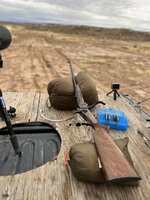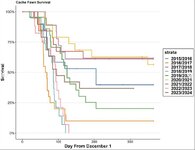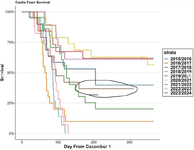

Get Better Mule Deer Hunting - Rokslide
Travis and Robby discuss some changes that could be on the horizon in at least three western states, Utah, Idaho, Wyoming for better mule deer hunting
Follow along with the video below to see how to install our site as a web app on your home screen.
Note: This feature may not be available in some browsers.


Lots to think about there Corb--thanks for listening and chiming in, always appreciate your insight as a UT resident.Wont be able to make the board meeting this time.
As someone that has been pretty out spoken about the continued tag cuts, this proposal from Utah has me torn. I cant say that I support it but cant say that I dont.
Here is what I like about it.
Its different. Its not just cutting tags. Cutting tags has worked so well that we have had to do basically every year for forty years. It is something that I really do think would help increase the quality and quantity of bucks on the landscape.
Its going to force people out of the units that may go this way. Tags should be easier to draw for those that are willing to take the additional handicap of the weapon regulations.
Here is what I dont like.
I am tired of having to change. I spent a bunch of time getting a scoped muzzleloader put together and a load built for it...only for them to take scopes off muzzleloaders (I supported that change.) I then spent all summer getting a peep sight muzzleloader put together. Now I am going to have to change it all again.
I bought a Leica 2800.com, NightForce and components to reload so I could have a gun capable of longer ranges. Thats a 2000 dollar investment down the shitter.
We regulated trail cams 2 years ago ( I supported that) all in the name of more/bigger bucks. We took scopes off muzzleloaders ( I supported that) all in the name of more/bigger bucks. We haven't given that time to see if it worked.
The "restricted weapons" definition was sold to us last year as "a way to provide more opportunity in the way of additional seasons." (I supported that) Now what is happening is the restricted weapons definition is being used to change our current opportunity.
Here are my long term concerns and purely speculation on my part.
1. If this works and we have an increase in older bucks, where does it stop? History has shown with people that once we reach a certain threshold, they only want more. Lets say that we end up with more 160 class bucks. Are people going to be happy or is it going to be a push for more regulations/cuts so we can have 180s? Then 200s?
2. We do this and it works. Then everyone sees all these bigger bucks but cant kill them. Then the push is to bring back the old (current) weapon regulations so they can kill them. We then get in this cycle of increase regulation to grow bigger bucks, and then roll back so people can kill them. ( I have a controversial theory about what is driving this but it may cause a shitshow of a thread)
3. It works and now people dont want to give up what we have built and the push becomes to turn these units into LE units because the quality is suddenly there. (This has happened in the past)
4. This works. Quality and quantity are increased but people dont want to take advantage of it. Tags arent increased because people think that killing one more buck is going to be the final nail in the coffin. (We have seen this in the past)
In the end, like I said, I am torn. I will not say one way or the other on supporting versus not supporting. The only thing I am going to say on this is...If this works, they better give us the increased opportunity that we are being told this is for. History is not on our side of receiving what we are being sold and this may take the division and the board to go against the loudest mouths.
There are a lot of other people in this state that you should listen to before me.Lots to think about there Corb--thanks for listening and chiming in, always appreciate your insight as a UT resident.
on 4., if we see a quality & quantity increase, I think people will take advantage of it, as long as there's more of them than the crowd that think one buck taken by someone else is one too many. I think it's small but can be vocal.
But that's why we're putting up these discussions so everyone has a chance to make known what they want the future of mule deer to be.
and make sure you give the feedback at the links we provided. They really need to hear this.
You can see everything here- https://wildlife.utah.gov/agendas-materials-minutes.htmlThere are a lot of other people in this state that you should listen to before me.
I agree with you that that crowd is pretty small but very vocal. My concern is that they have a lot of influence, especially with some of the younger hunters. Back when I dealt with the general public more, you could listen to a couple podcasts and know what the conversations with people would be centered around for the next couple weeks. This wildlife board has definitely "stood up" to that crowd more but we wont have that forever.
That is the rough draft of what will be sent to the wildlife board.

I'm so freaking color blind, I can't tell the graph, but you said 35% fawn survival. Was that for the fawns born in 2023 and checked again in December of 2023?I grew up on the Cache (one of the units for the proposed open sight rifle regulations) and have hiked thousands of miles on the unit and scouted/hunted hundreds of days over about 20 years.
We can argue about buck-specific management and try various things all we want and I'm not opposed to the proposed changes, but the Cache has a real habitat problem. Houses have been built on a good chunk of winter range and cheatgrass/junipers have encroached all over most the habitat below 8000 feet that isn't a subdivision. Until we can do some drastic habitat improvement I don't think it really matters how we manage buck hunting.
Coming off the bad 22-23 winter, I was hoping to see a big crop of fawns this year. In Southeast Idaho and Western Wyoming I saw a lot of does with twins and even some sets of triplets this year. That gives me hope that given a few good weather years, the deer numbers will bounce back. That wasn't my experience on the Cache, I've seen very few fawns. Here's a graph that Dr. Randy Larsen posted on Instagram of survival of radio collared fawns. ~35% survival on fawns in an excellent water/forage year is really discouraging to see. I try to be optimistic but data like this makes it tough to be positive about the long term outlook of the deer herd on the Cache.
View attachment 796944
I would be really open to trying something drastic like planting a bunch of Forage Kochia in some of the range that has been choked out by cheatgrass and seeing what happens. Forage Kochia is a non-native that deer love, and it will out compete cheatgrass. It's a long shot and the USFS likely wouldn't go for it becuase it's not native, but what do we have to lose? It's all cheatgrass now anyways.
Forage Kochia
extension.usu.edu
Planting Kochia helps out-compete Cheatgrass | Mule Deer
In many areas of the west then ranges are being overtaken by cheatgrass which is very unproductive to wildlife such as deer. It's also a fire hazard. Kochia is known to outcompete cheatgrass and deer love it. We should be planting more and more Kochia. We have a little in some areas. but we...www.monstermuleys.info
My buddy and I had this exact conversation when this was first proposed. Pretty much the entirety of Cache Valley is built on winter ground and they are building more. I have 10-15 deer in my backyard every winter and thats the ones that I see. My wife drives from one end of the valley to the other for work and is always talking about the dead deer on main throughout the winter.I grew up on the Cache (one of the units for the proposed open sight rifle regulations) and have hiked thousands of miles on the unit and scouted/hunted hundreds of days over about 20 years.
We can argue about buck-specific management and try various things all we want and I'm not opposed to the proposed changes, but the Cache has a real habitat problem. Houses have been built on a good chunk of winter range and cheatgrass/junipers have encroached all over most the habitat below 8000 feet that isn't a subdivision. Until we can do some drastic habitat improvement I don't think it really matters how we manage buck hunting.
I'm so freaking color blind, I can't tell the graph, but you said 35% fawn survival. Was that for the fawns born in 2023 and checked again in December of 2023?
I'll read the Kochia info too, thanks for posting.

My buddy and I had this exact conversation when this was first proposed. Pretty much the entirety of Cache Valley is built on winter ground and they are building more. I have 10-15 deer in my backyard every winter and thats the ones that I see. My wife drives from one end of the valley to the other for work and is always talking about the dead deer on main throughout the winter.
Like my buddy said. Where the hell are they going to put the deer and are we just saving them for 2000 pound bullets to kill them on the highway?
OK, thanks for the clarify and ya, bad winter hangover, but... the cluster of your lines is still under 70%. Randy and Brock did an episode and were talking about historical numbers closer to 90%, and Idaho has seen that too in the past. your point is still valid@robby denning I circled the 2023/2024 line, the bottom axis is Day from December 1, and all the lines start at 100%. I had assumed it was this years fawns (born spring 2024), but after looking at the graph closer, I'm thinking that line represents fawns born spring of 2023 and the fawns born spring of 2024 aren't shown in the data set. That would make sense, coming off the bad winter the mom's weren't in good shape so the fawns weren't in good shape. That horrible winter got us coming and going. Hopefully the fawns born spring of 2024 fair much better.
View attachment 797014
That section is a meat grinder. Same with the Millville/Nibley area.I drive from Preston to Logan every day and there's a new roadkill or two between Richmond and Smithfield just about every day. That certainly isn't helping anything.
It would be really great if we could turn the cheatgrass/junipers into more useable habitat and keep some of those deer up in the foothills. I don't claim to have all the answers and doing the kind of extensive habitat work that is needed is going to be expensive but I'm afraid if we don't take some kind of drastic action with habitat we'll get past a point of no return, and we might already be past that point.
Beautiful pea shooter Robby!View attachment 796385

Get Better Mule Deer Hunting - Rokslide
Travis and Robby discuss some changes that could be on the horizon in at least three western states, Utah, Idaho, Wyoming for better mule deer huntingwww.rokslide.com
I think Montana’s approach is a travesty to the resource.Not specific to Utah, I’m a MT resident, but a subject that hits close to home.
@robby denning
I was a little surprised to hear your thoughts on rut hunting in Idaho. I’m all about opportunity, but it can definitely go too far. MT is a great example of that. General season tags that go until late November every year is devastating to buck populations. It’s getting to the point where 115” 3x3 are considered “nice shooters” by locals. A 140” 4x4 is called a “big deer” Not an exaggeration. Based on reactions I’ve seen from most hunters, even very experienced locals, they’ve seen maybe one or two 170 class bucks in the last 10-20 years.
I’ve been discussing how this could be addressed with buddies, and have often appealed to how Idaho does things with their season dates. In my mind, an October season allows for lots of opportunity without crushing buck numbers…Even if we allowed the first week or so of November. But the 10-25 is a straight blood bath for 2-3 year old deer every year…
I’ve wondered if we did a 4-5 week season Oct 1-31, or even Oct 1- Nov 5/7. Then had a random lottery for an extended season rut hunt. 25% of tag holders (or something along those lines). Keeps opportunity, protects the younger deer allowing for some quality, spreads out hunting pressure and still gives great odds of having a rut hunt and good chance at older deer for the average hunter.
As noted in the podcast, these long season dates like we have in MT really do spread out hunting pressure. It’s amazing to see how animals respond and change behavior as the season progresses, both for archery and rifle.
Based on the fact that this thread exists, maybe it’s not enough. Other states have been far more proactive than MT about mule deer management, and are still in the same boat…
Sent from my iPhone using Tapatalk
Great posts Corb!That section is a meat grinder. Same with the Millville/Nibley area.
I agree that the current habitat needs to be improved to keep them up there and not down in the valley. As much as cost is going to be a prohibiting factor, it’s probably more that the ground is private or Federally managed.
I think Montana’s approach is a travesty to the resource.
Hunting deer with the most capable weapon system during the entirety of the rut with general season tags is just crazy to me. I’ll never wrap my head around it.
I think Montana’s approach is a travesty to the resource.
Hunting deer with the most capable weapon system during the entirety of the rut with general season tags is just crazy to me. I’ll never wrap my head around it.
